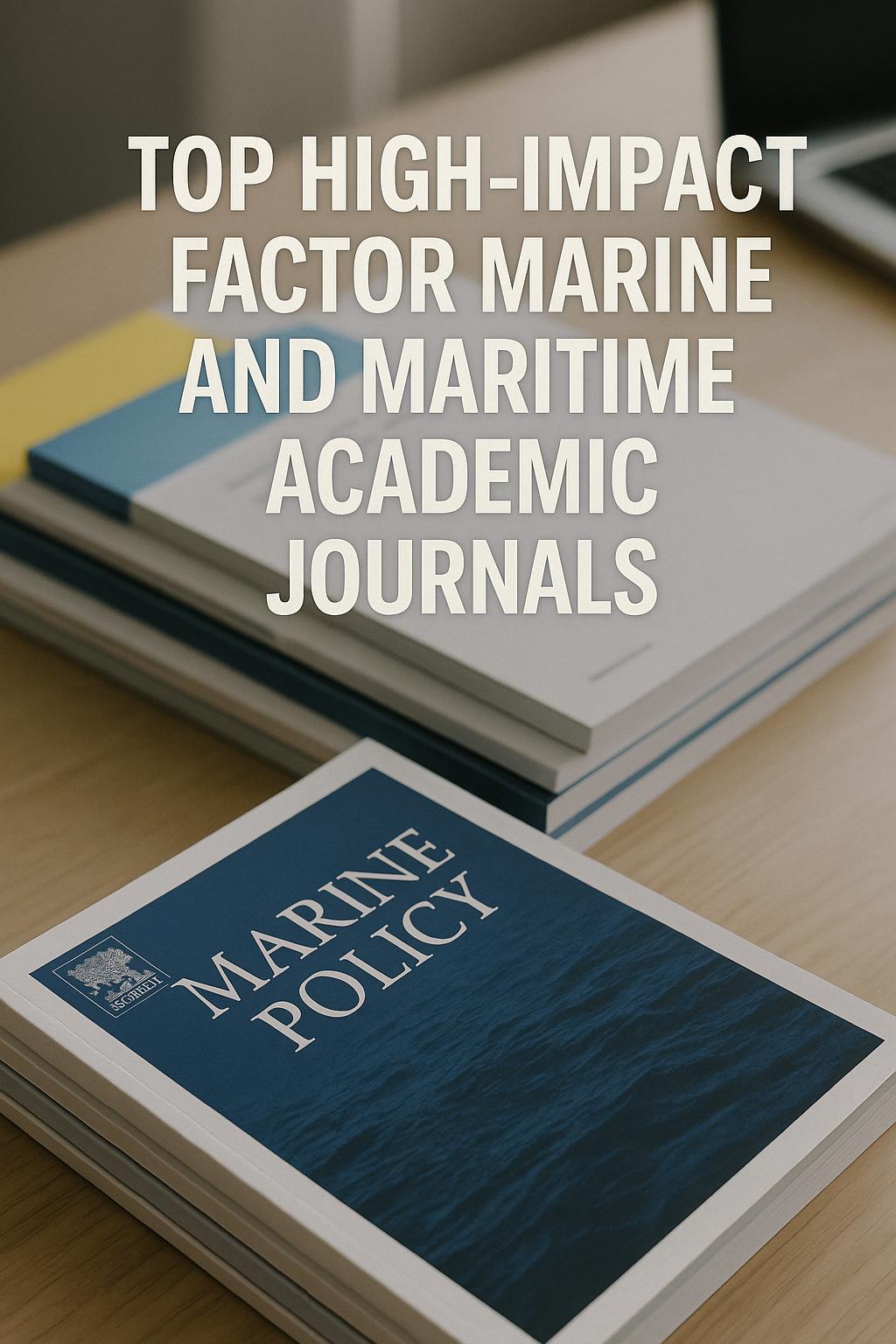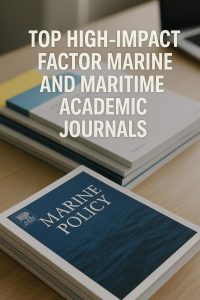Explore the top high-impact marine and maritime academic journals driving research and innovation in shipping, ocean engineering, and marine science. Discover the journals shaping the future of the maritime industry.
Why High-Impact Journals Matter in Modern Maritime Operations
In today’s fast-evolving maritime landscape—where decarbonization, automation, and digitization are transforming every facet of the industry—access to credible, peer-reviewed research is more critical than ever. High-impact academic journals in marine and maritime studies offer cutting-edge insights, data-driven analysis, and technological breakthroughs that influence policymaking, ship design, marine resource management, and operational efficiency.
For shipowners, port authorities, researchers, and maritime academies, these journals act as intellectual compasses. They do more than publish theories—they help define industry standards, spark innovation, and influence regulatory changes via institutions like the IMO, ICS, and IACS. From naval architecture and oceanography to shipping economics and sustainability, the following journals represent the most authoritative voices in the global maritime research ecosystem.
What Defines a High-Impact Journal?
Impact factor (IF) is a metric developed by Clarivate’s Journal Citation Reports (JCR), reflecting the average number of citations to recent articles published in a journal. While IF is not the sole measure of a journal’s value, it does signal influence, scholarly relevance, and research quality. Additional indicators of journal reputation include:
- Scopus CiteScore
- H-index
- Peer-review rigor
- Affiliation with leading institutions like Elsevier, Springer, Taylor & Francis, or academic bodies such as RINA or SNAME.
Top 14 High-Impact Marine and Maritime Academic Journals :
Here is a curated list of 14 high-impact marine and maritime academic journals, ranked by their 2023 impact factors, along with hyperlinks to their respective homepages:
1. Annual Review of Marine Science
-
Impact Factor (2023): 14.3
-
Focus: Comprehensive reviews in marine science, including oceanography, marine biology, and geochemistry.
-
Publisher: Annual Reviews
-
Homepage: Annual Review of Marine Science
2. Marine Pollution Bulletin
-
Impact Factor (2023): 7.001
-
Focus: Research on marine pollution, its sources, effects, and control measures.
-
Publisher: Elsevier
-
Homepage: Marine Pollution Bulletin
3. Ecotoxicology and Environmental Safety
-
Impact Factor (2023): 6.2
-
Focus: Studies on the toxicological effects of environmental contaminants, including marine environments.
-
Publisher: Elsevier
-
Homepage: Ecotoxicology and Environmental Safety
4. Marine Structures
-
Impact Factor (2023): 5.0
-
Focus: Design, analysis, and performance of marine structures such as ships and offshore platforms.
-
Publisher: Elsevier
-
Homepage: Marine Structuresziaulmunim.com
5. Ocean Engineering
-
Impact Factor (2023): 4.0
-
Focus: Research on ocean engineering, including ship design, marine structures, and offshore engineering.
-
Publisher: Elsevier
-
Homepage: Ocean Engineering
6. Marine Policy
-
Impact Factor (2023): 3.5
-
Focus: Studies on marine policy, governance, and management.
-
Publisher: Elsevier
-
Homepage: Marine Policy
7. Marine Chemistry
-
Impact Factor (2023): 3.807
-
Focus: Chemical processes in marine environments, including biogeochemical cycles.
-
Publisher: Elsevier
-
Homepage: Marine Chemistry
8. Deep Sea Research Part I: Oceanographic Research Papers
-
Impact Factor (2023): 2.955
-
Focus: Research on the physical, chemical, and biological aspects of deep-sea environments.
-
Publisher: Elsevier
-
Homepage: Deep Sea Research Part I
9. Deep Sea Research Part II: Topical Studies in Oceanography
-
Impact Factor (2023): 2.732
-
Focus: Thematic studies on oceanographic topics, often based on specific research programs.
-
Publisher: Elsevier
-
Homepage: Deep Sea Research Part I
10. Journal of Marine Science and Engineering (JMSE)
-
Impact Factor (2023): 2.7
-
Focus: Multidisciplinary research in marine science and engineering, including naval architecture and oceanography.
-
Publisher: MDPI
-
Homepage: JMSE
11. Journal of Marine Science and Technology
-
Impact Factor (2023): 2.7
-
Focus: Research on marine science and technology, including shipbuilding and ocean engineering.
-
Publisher: Springer
-
Homepage: Journal of Marine Science and TechnologySpringerLink
12. Journal of Marine Engineering & Technology
-
Impact Factor (2023): 4.1
-
Focus: Studies on marine engineering, including propulsion systems and ship design.
-
Publisher: Taylor & Francis
-
Homepage: Journal of Marine Engineering & TechnologyTaylor & Francis Online
13. Maritime Policy & Management
-
Impact Factor (2023): 2.4
-
Focus: Research on maritime policy, shipping management, and logistics.
-
Publisher: Taylor & Francis
-
Homepage: Maritime Policy & Management
14. WMU Journal of Maritime Affairs (JOMA)
-
Impact Factor (2023): ~1.5
-
Focus: Maritime governance, ocean policy, sustainability, safety management, and seafarer training
-
Publisher: Springer (on behalf of the World Maritime University – WMU, established by the IMO)
-
Why It Matters: As a publication of the IMO-founded World Maritime University, JOMA plays a critical role in disseminating research on the legal, institutional, and human elements of the maritime sector. It’s particularly relevant for maritime policymakers, educators, and researchers focused on the global governance of shipping.
-
Homepage: WMU Journal of Maritime Affairs
These journals represent the forefront of marine and maritime research, offering valuable insights for professionals, researchers, and students in the field. Staying updated with their publications can enhance understanding and contribute to advancements in maritime science and policy.
–
Additional Noteworthy Journals (Emerging or Niche)
- Journal of Offshore Mechanics and Arctic Engineering (ASME)
- Ships and Offshore Structures (Taylor & Francis)
- Journal of Ocean Technology (MI)
- Marine Resource Economics
- Frontiers in Marine Science (open access)
These journals support specialized research on Arctic operations, fisheries, innovation ecosystems, and regional maritime governance.
Case Study: Academic Journals Influencing IMO Regulation
A 2022 article in Marine Pollution Bulletin assessing the cumulative effects of ballast water discharges led to significant debate within the IMO’s Marine Environment Protection Committee (MEPC). The paper’s findings on non-indigenous species’ spread directly contributed to revised ballast management protocol discussions.
Similarly, structural failure data published in Marine Structures has informed rule development by DNV and ABS regarding fatigue limits in harsh weather regions.
FAQ – Marine and Maritime Academic Journals
Q1: How do I know if a journal is high-impact in maritime studies?
Check for a high impact factor, Scopus indexing, citation counts, and publisher reputation (e.g., Elsevier, Springer, Taylor & Francis).
Q2: Are open-access maritime journals credible?
Yes, especially if they are peer-reviewed and indexed in Scopus or Web of Science. JMSE and Frontiers in Marine Science are good examples.
Q3: Which journal is best for environmental maritime research?
Marine Pollution Bulletin and Transportation Research Part D are leaders in maritime environmental impact research.
Q4: Can practitioners benefit from academic journals, or are they only for researchers?
Absolutely. Engineers, port managers, and shipping executives use these journals to guide decision-making and stay updated on global trends.
Q5: Are articles from these journals used in regulatory frameworks?
Yes. IMO, EMSA, and classification societies frequently cite peer-reviewed journal research in safety, environmental, and design regulations.
Q6: How can students access these journals?
University libraries often have subscriptions. Open-access journals like JMSE are freely available. Elsevier and Springer also offer some free articles.
Conclusion
In an industry driven by safety, sustainability, and efficiency, marine and maritime academic journals are more than academic repositories—they are instruments of progress. From influencing IMO conventions to guiding shipbuilders and policymakers, these journals shape the narrative and trajectory of maritime development.
Shipowners looking to reduce emissions, ports aiming to optimize logistics, and academics training the next generation of naval engineers all benefit from staying informed via credible, peer-reviewed research. In an era of climate urgency and technological revolution, knowledge dissemination through top journals has never been more vital.
Engage, read, and cite—because maritime innovation starts with informed action.


